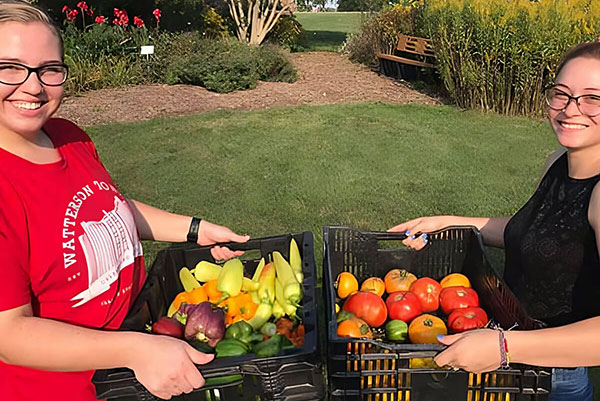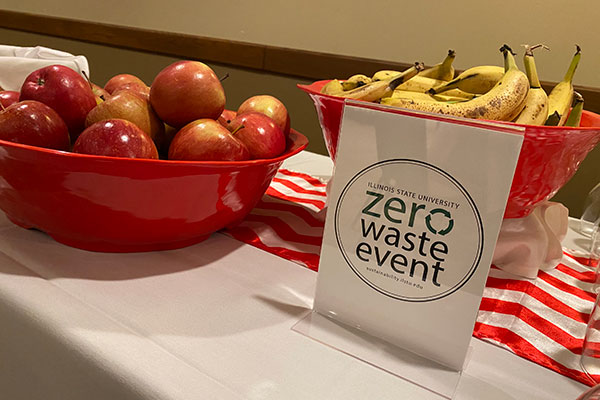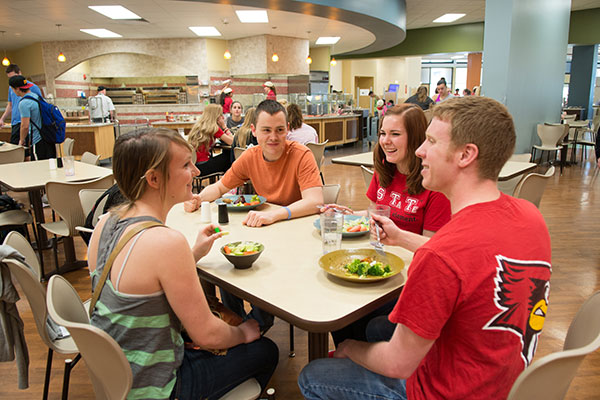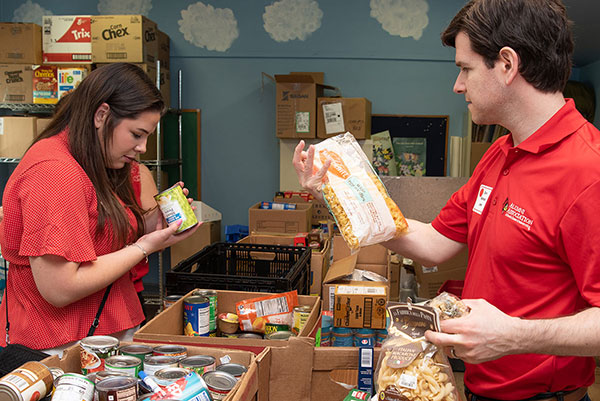Food and Events
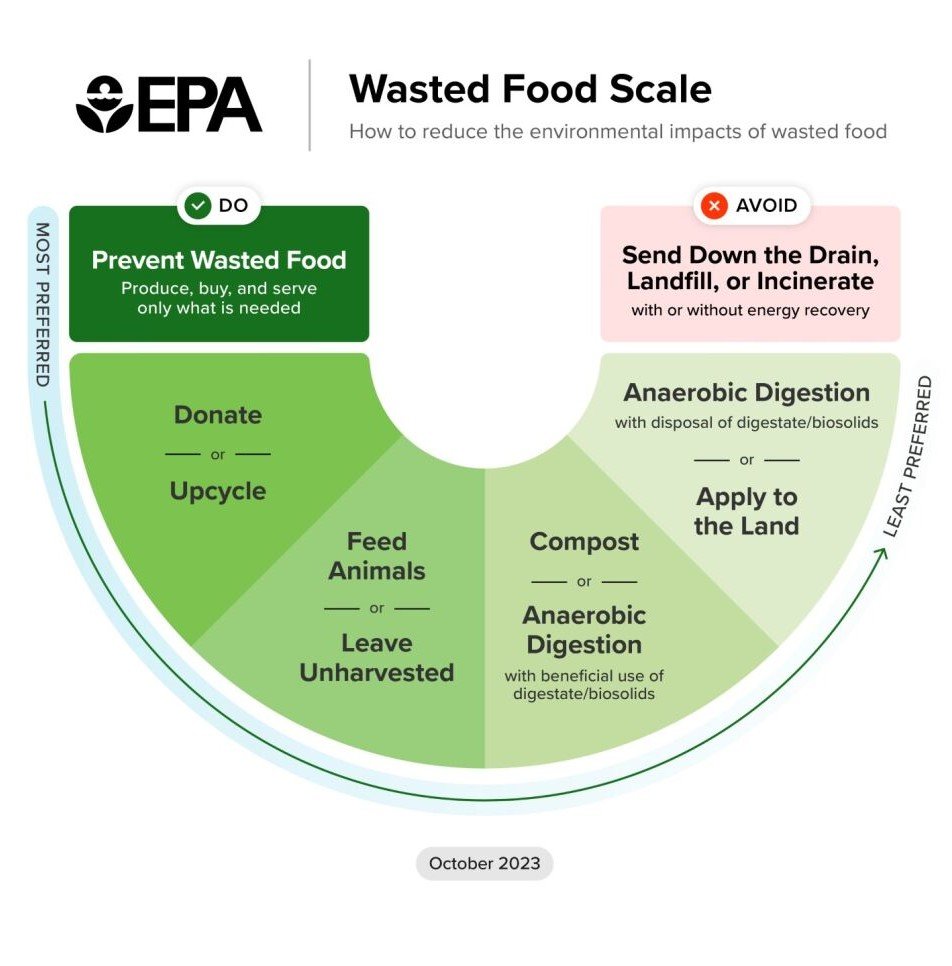
When it comes to food and events on campus, our overall goal is to act responsibly. We use the Environmental Protection Agency's Wasted Food Scale as our guide.
How We Use the Food Recovery Hierarchy at Illinois State
-

Prevent Wasted Food
Our Campus Dining Centers have utilized trayless dining for many years. This practice has been proven to reduce food waste right from the beginning.
-

Donate or Upcycle
We have a local Food Recovery Network chapter on campus. Student volunteers pick up leftover food from the dining centers and donate it to people in need. We're also close partners with the School Street Food Pantry. They provide food and other necessities to students experiencing food insecurity.
We also work with Mahoney Environmental company to recycle used fryer oil, waste cooking oil, and grease trap material. These waste products turn into raw material that can be used to manufacture new products such as animal feed or alternative fuel, like biodiesel.
-
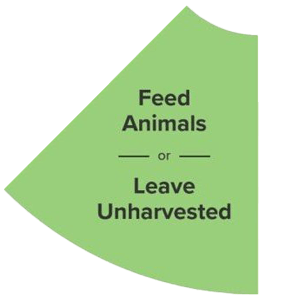
Feed Animals
It's possible for materials like plastic to end up in our compost stream. These kinds of materials are harmful to animals. That's why we send all our food scraps to a commercial compost facility.
-
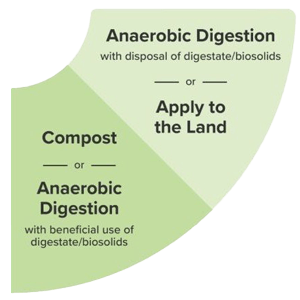
Compost or Anaerobic Digestion
We work with a commercial compost facility, Better Earth, in nearby Peoria Illinois to compost all the food waste in our dining centers, as well as the restaurants & catered events throughout Bone Student Center. We also offer composting stations across campus.
-

Landfill
Our efforts to reduce, reuse, recycle, and compost greatly decrease the amount of waste we send to landfill.
Being Responsible Food Consumers
Thousands of students eat multiple meals on campus throughout the school year. It's essential we create sustainable practices in our dining centers to reduce environmental harm. All our dining centers are zero waste. Here's how we're making that happen.
-
Trayless Dining
You won't find trays in our dining centers. Trayless dining reduces two harmful environmental factors: food waste and over-consumption. This also helps conserve water because it's one less thing we have to wash.
-
Reusable Products
Our dining centers use reusable dishes instead of disposable plates, silverware, cups or individually packaged items. This helps reduce waste.
-
Compostable Containers
All takeout containers from our Dining Centers are compostable. Paper straws are only available on-the-go or upon request.
-
Plant-Based Choices
We offer a variety of plant-based options in our dining centers. This not only meets the needs of our vegetarian and vegan students, but it also helps the environment. Meat and dairy production emit greenhouse gas emissions. Plant-based food production helps reduce greenhouse gas emissions.
-
Local Food
Local food doesn't have to travel as far to reach our plates. This helps lessen our carbon footprint and supports the local economy. Local food vendors at Illinois State include:
- Cahokia Rice - McClure, IL
- Greens for You Hydroponics Farm - Arthur, IL
- Janie's Mill - Ashkurn, IL
- Bane Family Meats - Sidney, IL
- Prairie Fruits and Farm/Creamery - Champaign, IL
You're Invited
Our annual Earth Day Breakfast features a variety of local, Fair Trade and plant based foods to raise awareness and build partnerships with local growers.
-
Composting Leftovers
The unwanted food in our dining centers and catered events at Bone Student Center gets turned into compost to help future plants and food grow.
Composting in Action
Learn how the composting process works at Illinois State dining centers and catered events in Bone Student Center.
-
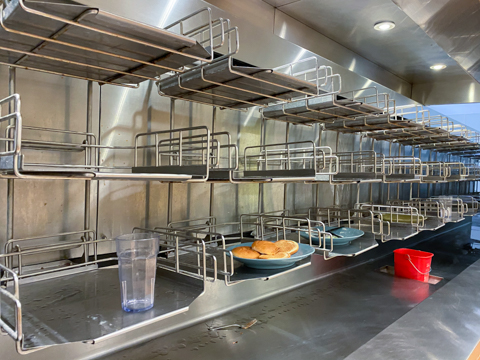
Students place unwanted food on a conveyor belt.
-
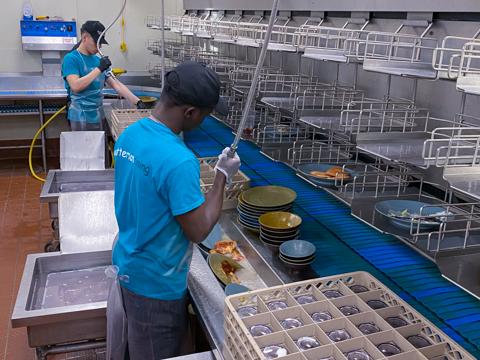
Food waste and napkins are rinsed off and travel down a slurry to the pulper room.
-
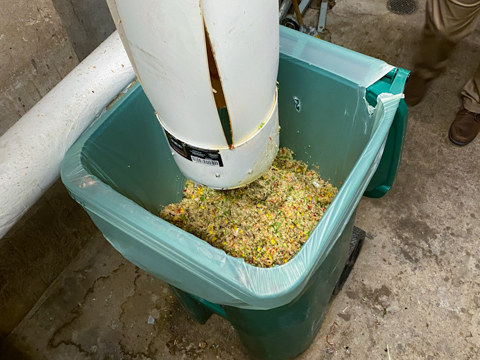
The pulper chops everything up and squeezes out excess liquid. The end result is put in a compostable bag.
-
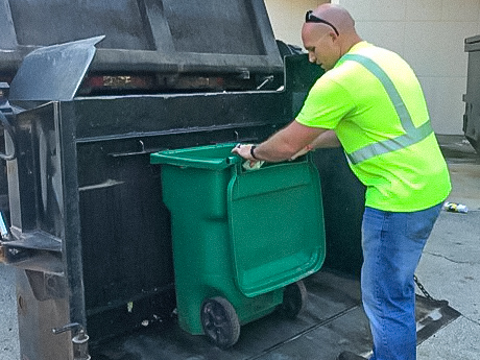
Our commercial composting partner, Better Earth Logistics, picks up our compostable bags three times a week.
-
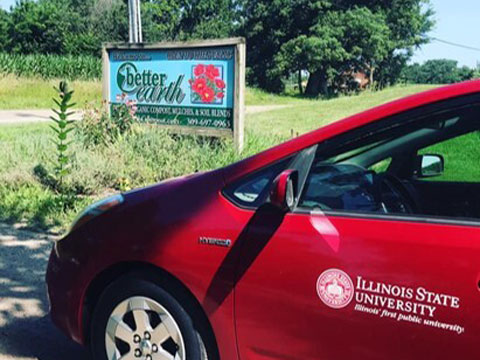
Better Earth Compost facility processes our food scrap and turns it into compost within approximately 90 days.
-
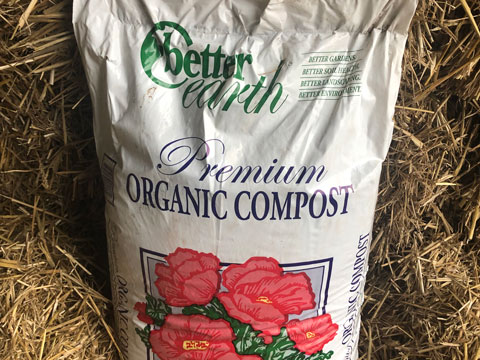
Local garden shops sell the compost and we occasionally use and spread it across campus.
Being Responsible at Events
Many events take place at Illinois State everyday. Here's what we're doing to ensure sustainability has a strong presence at each one.
Achieving Zero Waste
Zero waste means 90 percent of what's consumed at an event is reusable, recyclable, or compostable. Consumable products at an event can include food, containers, and utensils.
Incorporating Sustainable Food Products
Our events include food that comes from local and fair trade producers.
Learn more about our fair trade efforts
Assisting Campus Partners
Work with us to make your next event as green as possible. Sustainable products often come with a bigger price tag. We can help reduce your cost with micro grants. Use them to purchase compostable and reusable products.
Contact us about your next event
-
Root for the Redbirds with minimal waste.
Athletic events can easily create a lot of waste. In a short amount of time, thousands of people consume food, beverages, and various products that eventually end up in landfills. We're partnering with athletics to find creative ways to combat this. Here's what you can expect at any Illinois State contest.
-
Reuse: Bring in an empty reusable clear container or cup to any of our stadiums to fill up at the multiple drinking fountains.
-
Compostable products: We're reducing single-use plastic waste and using more compostable straws and containers whenever possible.
-
Recycling: We're working towards adding more recycling bins to our stadiums and practice facilities.
-
Zero Waste: We're pursuing zero waste at our athletic events. We want 90 percent of the products used to be reusable, recyclable, and compostable. The President’s Tent before home football games has transitioned to a Zero Waste Event, showcasing an institutional committment to sustainability at campus events.
-
Get involved in more sustainable food practices.
Take steps to be a responsible food consumer.
-
Grow your own food.
The Town of Normal offers two community gardens to grow your own food. We're looking to expand this opportunity on campus.
-
Take what you need.
When it comes to eating in the dining center, grocery shopping, or cooking your own meals, just get what you need. This helps reduce waste.
-
Experiment with plant based foods.
Plant agriculture is more efficient than animal agriculture and creates less of a burden on the environment. Try a plant based diet one day or meal at a time.
Plant-Based at State is a registered student organization (RSO) that promotes a healthy plant-based lifestyle. Learn more about this RSO
-
Purchase local foods when possible.
Local foods don't have to travel as far to make it to your plate. This helps reduce your carbon footprint and benefits your local community and economy.
Add the Food Studies minor to your academic journey or take a few classes to get more engaged in sustainable food.
